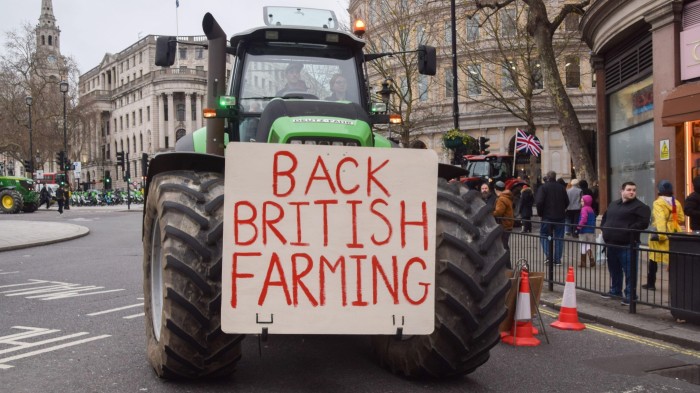Unlock the Editor’s Digest for free
Roula Khalaf, Editor of the FT, selects her favourite stories in this weekly newsletter.
Major supermarkets Tesco and Lidl have come out batting for UK farmers, calling for Prime Minister Sir Keir Starmer to pause his inheritance tax reforms or else put the sector’s future at risk.
British farmers have taken to the streets in London in recent months to protest against the changes to inheritance tax reliefs announced in the October Budget, which will end decades of exemption from death duties.
The reforms mean landowners will from April 2026 be subject to a 20 per cent levy on agricultural land above a threshold of between £1.3mn and £3mn, depending on whether they are married and if they own a home.
Ashwin Prasad, Tesco’s chief commercial officer, on Wednesday said the UK’s biggest supermarket “fully understand[s]” concerns raised by “many smaller farms” that were reliant on agricultural property relief and business property relief.
“We’ll be supporting the National Farmers Union’s calls for a pause in the implementation of the policy, while a full consultation is carried out,” he added. “This is not just a debate about individual policies — the UK’s future food security is at stake.”
Lidl said it was “concerned that the recent changes to the IHT regime will impact farmer and grower confidence and hold back the investment needed to build a resilient, productive and sustainable British food system”.
Meanwhile Co-op Dairy Group, a group of milk suppliers, told members in a letter that it had “directly contacted relevant government departments to communicate our hope that they will look again at the impact of the . . . changes” and said it backed calls to pause implementation of the policy.
Supermarkets themselves have drawn fire from farmers, with tractors this month parked at a number of major retailers around the country to raise awareness of the impact of the tax changes. On 16 January, supermarket Morrisons was granted a High Court injunction to block further protests.
Prior to the October Budget, farm campaign groups slammed supermarkets for squeezing their margins with low food prices and undercutting them by not backing homegrown produce.
Earlier on Wednesday, the Office for Budget Responsibility released a short costing of the IHT policy, estimating that it would raise an extra £500mn for the Treasury annually between 2027 and 2029, in line with the government’s estimates.
But the fiscal watchdog noted that receipts would probably taper off after seven years as farmers increasingly gifted their properties to children and modified their tax planning strategies.
The OBR also suggested that it would be “more difficult for some older individuals to quickly restructure their affairs” in terms of inheritance planning to adjust to the new measures.
Victoria Atkins, Conservative shadow environment secretary, said the government had “chosen to destroy British family farming for little return. The OBR is clear that it will be near impossible for older farmers to restructure their affairs quickly in response to this vindictive tax.”
Farmers say the sector was struggling with the pressures of climate change, real-term cuts to subsidies, high inflation, wafer-thin margins and the prospect of increased competition as the UK strikes post-Brexit trade deals before chancellor Rachel Reeves announced the IHT changes.
The exemption was introduced in the 1980s to allow farms to remain in the same family after the death of an owner, a trend that many have warned will become much harder. However, it has helped push up the price of fields as wealthy individuals have bought agricultural land as a form of legal tax avoidance.
Farmers looking to pass on their estate, and their spouses, are each eligible for £1mn of relief before they start paying IHT on their land, on top of the usual inheritance allowances.
Given that couples already enjoy a threshold of £1mn on their estates that means that two spouses would enjoy a threshold nearer to £3mn, officials have noted.
A government spokesperson said: “Our reform to agricultural and business property reliefs will mean estates will pay a reduced effective inheritance tax rate of 20%, rather than standard 40%, and payments can be spread over 10 years, interest free.
“This is a fair and balanced approach, which fixes the public services we all rely on, affecting around 500 estates next year.”
Read the full article here

